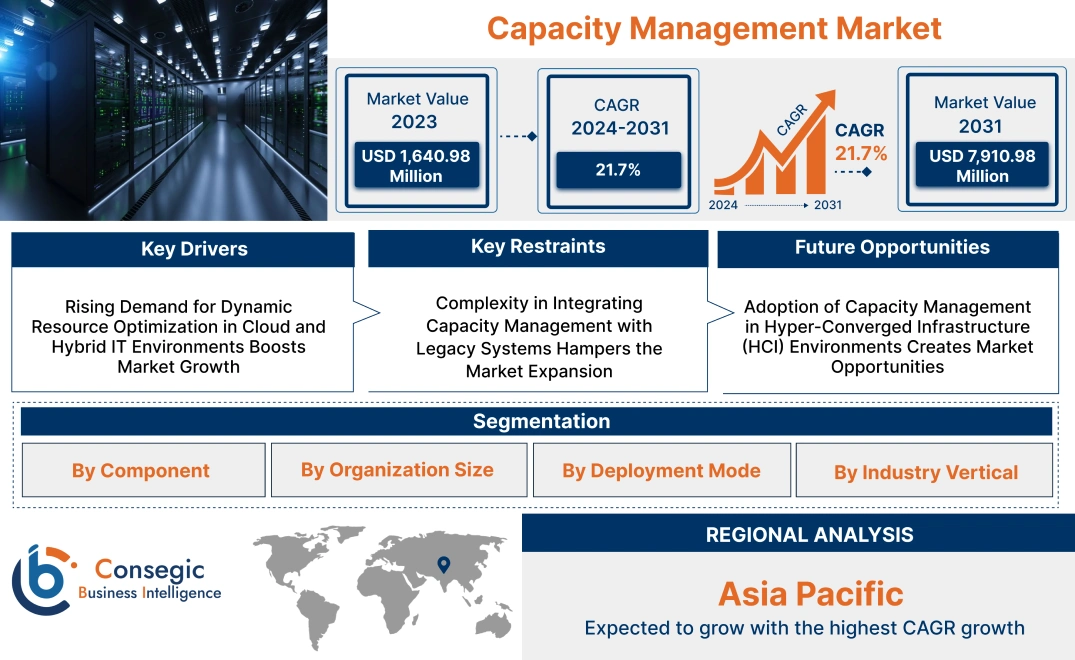- Summary
- Table Of Content
- Methodology
Capacity Management Market Size:
Capacity Management Market size is estimated to reach over USD 7,910.98 Million by 2031 from a value of USD 1,640.98 Million in 2023 and is projected to grow by USD 1,968.30 Million in 2024, growing at a CAGR of 21.7% from 2024 to 2031.
Capacity Management Market Scope & Overview:
Capacity management involves the process of planning, monitoring, and optimizing resources to ensure that IT infrastructure and services meet current and future needs efficiently. This practice focuses on balancing resource availability with business needs, enabling organizations to optimize performance, prevent downtime, and control operational costs. Capacity management solutions include tools and strategies for forecasting resource requirements, assessing performance metrics, and managing workloads across data centers, cloud environments, and IT systems. Key end-users of capacity management solutions include IT service providers, cloud service providers, financial institutions, and large enterprises. As organizations prioritize performance optimization and cost management, the market need for capacity management tools and services is expected to grow, driven by the need for efficient and scalable IT infrastructure.
Capacity Management Market Dynamics - (DRO) :
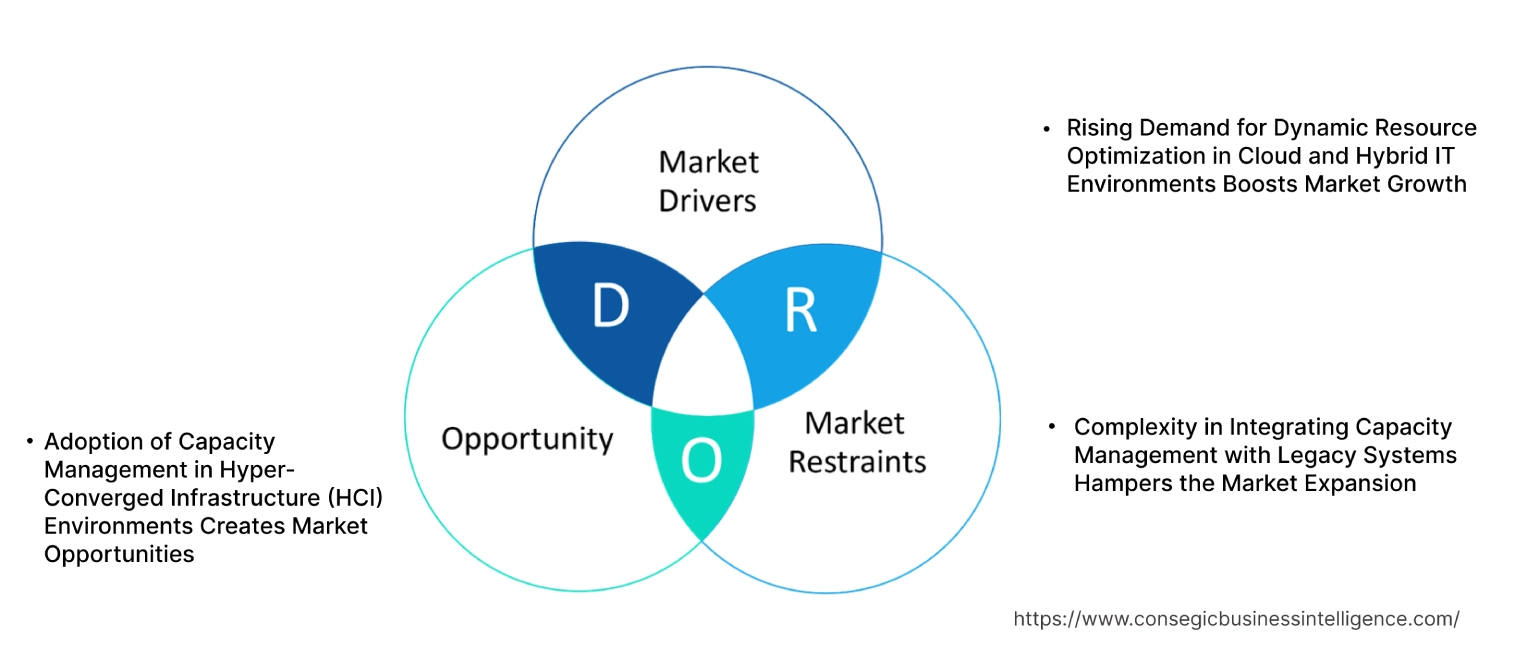
Key Drivers:
Rising Demand for Dynamic Resource Optimization in Cloud and Hybrid IT Environments Boosts Market Growth
The growing complexity of cloud and hybrid IT infrastructures is a significant driver for the capacity management market. As enterprises increasingly adopt cloud-based services and integrate hybrid IT architectures, managing and optimizing resource capacity across diverse environments has become more challenging. Traditional capacity planning tools are often inadequate in handling the dynamic nature of cloud workloads, which can fluctuate rapidly based on user needs and application requirements. Modern capacity management solutions equipped with AI-driven predictive analytics and real-time monitoring capabilities are gaining traction, as they enable IT teams to optimize resource allocation, prevent over-provisioning, and reduce costs. The need for agile capacity management strategies that can adapt to variable workloads, particularly in industries like e-commerce, financial services, and media streaming, is fueling the capacity management market demand for advanced solutions tailored to cloud and hybrid IT environments.
Key Restraints :
Complexity in Integrating Capacity Management with Legacy Systems Hampers the Market Expansion
A major restraint for the capacity management market is the complexity of integrating modern capacity management solutions with legacy IT systems. Many organizations, especially in industries like manufacturing, energy, and government, continue to operate legacy infrastructure that was not designed with modern capacity planning in mind. Integrating advanced capacity management tools with these older systems often requires extensive customization, which can be time-consuming and costly. Additionally, legacy systems may lack the necessary APIs and data interfaces for seamless integration, making it difficult to gain accurate, real-time insights into capacity usage. This integration constraint results in data silos, limiting the effectiveness of capacity management efforts and hindering the ability to optimize resource utilization across the entire IT landscape. As a result, organizations struggle to fully leverage capacity management solutions, slowing down adoption rates, particularly in industries with extensive legacy infrastructure. Therefore, the aforementioned factors hinder the capacity management market growth.
Future Opportunities :
Adoption of Capacity Management in Hyper-Converged Infrastructure (HCI) Environments Creates Market Opportunities
The growing adoption of hyper-converged infrastructure (HCI) solutions in data centers and enterprise IT environments creates a unique opportunity for capacity management providers. HCI combines computing, storage, and networking into a single, integrated system, simplifying infrastructure management but also presenting challenges in terms of capacity planning and optimization. As enterprises deploy HCI to streamline operations and reduce IT complexity, they require advanced capacity management tools that can offer granular insights into resource usage, support dynamic scaling, and prevent over-provisioning. Capacity management solutions designed specifically for HCI environments, which provide comprehensive monitoring and automated optimization features, help organizations maximize the efficiency of their hyper-converged systems, reduce operational costs, and enhance scalability. Therefore, the adoption of hyper-converged infrastructure drives capacity management market opportunities.
Capacity Management Market Segmental Analysis :
By Component:
Based on components, the capacity management market is segmented into software and services (Consulting, Integration & Deployment, and Support & Maintenance).
The software segment accounted for the largest revenue of the total capacity management market share in 2023.
- Capacity management software offers tools for monitoring, analyzing, and optimizing resource usage across IT infrastructure, including servers, networks, and storage systems.
- The increasing need for real-time capacity monitoring and predictive analytics to prevent system overloads and enhance operational efficiency drives the market pull for software solutions.
- Advanced capacity management software features capabilities like automation, machine learning, and AI-driven analytics, providing deep insights and enabling proactive resource management.
- The shift towards cloud-based capacity management solutions is further propelling the growth of the software segment, as organizations seek scalable and flexible tools to manage dynamic workloads.
- The software segment leads the market due to its ability to deliver comprehensive monitoring, optimization, and predictive analytics capabilities, meeting the evolving needs of modern IT environments.
- As per capacity management market analysis, the software segment boosts the market progress.
The services segment is anticipated to register the fastest CAGR during the forecast period.
-
- The services segment includes consulting, integration & deployment, and support & maintenance services, essential for the successful implementation and operation of capacity management solutions.
- Consulting services help organizations assess their current capacity needs, identify potential issues, and develop customized strategies for optimization.
- Integration & deployment services are critical for configuring and integrating capacity management software with existing IT infrastructure, ensuring seamless operation.
- Ongoing support & maintenance services are of high interest, as organizations require continuous monitoring, updates, and troubleshooting to maintain optimal system performance.
- The services segment is expected to grow rapidly due to the increasing complexity of IT environments and the rising demand for expert support in capacity planning and optimization.
- As per capacity management market trends, the services segment boosts the market progress.
By Organization Size:
Based on organization size, the market is segmented into small & medium enterprises (SMEs) and large enterprises.
The large enterprises segment accounted for the largest revenue share in 2023.
- Large enterprises typically have complex IT infrastructures with extensive resource needs, making capacity management essential for maintaining performance and preventing downtime.
- These organizations invest heavily in advanced capacity management solutions to optimize their IT resources, enhance efficiency, and reduce operational costs.
- The increasing adoption of hybrid and multi-cloud environments by large enterprises is driving the market need for sophisticated capacity management tools that offer real-time insights and predictive analytics.
- Large enterprises benefit from comprehensive capacity management solutions that integrate seamlessly with their existing systems, providing centralized control and advanced monitoring capabilities.
- The large enterprises segment dominates the market due to its need for robust capacity management solutions to handle extensive IT resources and dynamic workloads.
- Therefore, as per segmental trends analysis, the large enterprises segment drives the capacity management market expansion.
The SME segment is anticipated to register the fastest CAGR during the forecast period.
- SMEs are increasingly adopting capacity management solutions to optimize their limited IT resources and improve operational efficiency.
- The shift towards digital transformation and cloud adoption among SMEs is driving the requirement for scalable and cost-effective capacity management tools.
- SMEs often prefer cloud-based capacity management solutions due to their flexibility, lower upfront costs, and ease of deployment.
- The rising awareness of the benefits of proactive capacity management, such as improved performance and reduced risk of system overloads, is contributing to the rapid progress of this segment.
- The SME segment is expected to grow rapidly, driven by the increasing adoption of cloud-based solutions and the focus on resource optimization in smaller organizations.
- As per segmental trends analysis, the SME segment boosts the market development.
By Deployment Mode:
Based on deployment mode, the market is segmented into on-premise, cloud-based, and hybrid.
The cloud-based segment accounted for the largest revenue share of 64.02% in 2023.
- Cloud-based capacity management solutions offer scalability, flexibility, and ease of access, making them the preferred choice for many organizations.
- The growing adoption of cloud computing across industries has significantly increased the demand for cloud-based capacity management tools, which can handle dynamic workloads and provide real-time insights.
- Cloud-based solutions allow organizations to scale their capacity management capabilities as needed, without the need for significant capital investment in hardware.
- The integration of AI and machine learning in cloud-based capacity management tools enhances predictive analytics, helping organizations anticipate and address capacity issues proactively.
- The cloud-based segment leads the market due to its flexibility, scalability, and ability to support modern, dynamic IT environments.
- As per segmental trends analysis, the cloud-based segment boosts the market development.
The hybrid deployment segment is anticipated to register the fastest CAGR during the forecast period.
- Hybrid deployment combines on-premise and cloud-based solutions, offering organizations the flexibility to manage both local and cloud resources effectively.
- This approach is particularly popular among large enterprises and industries with complex IT environments that require a mix of on-premise control and cloud scalability.
- The increasing adoption of multi-cloud strategies and the need for seamless integration of diverse IT resources are driving the need for hybrid capacity management solutions.
- Hybrid deployment offers the best of both worlds, allowing organizations to optimize resource usage, enhance security, and maintain control over sensitive data while leveraging cloud benefits.
- The hybrid segment is expected to grow rapidly, driven by the increasing adoption of multi-cloud strategies and the need for integrated capacity management across diverse IT environments.
- As per segmental trends analysis, the hybrid deployment segment boosts the market progress.
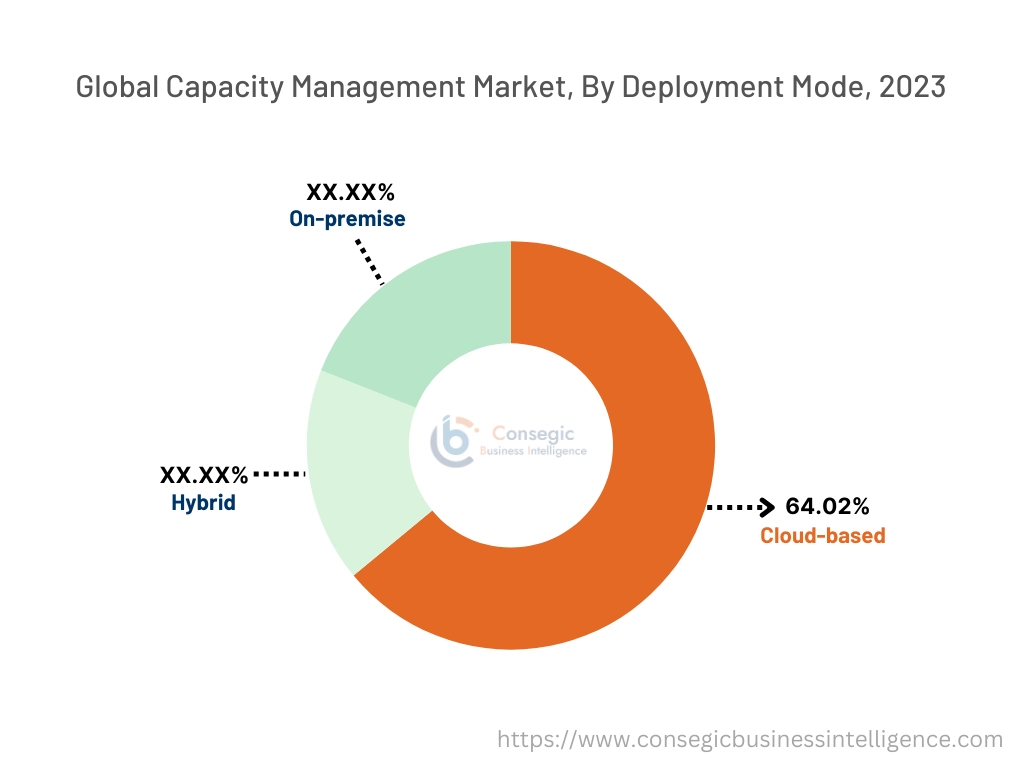
By Industry Vertical:
Based on industry vertical, the capacity management market is segmented into IT & telecom, healthcare, BFSI, manufacturing, retail, and government & public sector.
The IT & telecom segment accounted for the largest revenue share in 2023.
- The IT & telecom industry heavily relies on capacity management solutions to optimize network performance, prevent downtime, and ensure reliable service delivery.
- The increasing requirement for data-intensive applications and the shift towards 5G networks are driving the adoption of advanced capacity management tools in this sector.
- Capacity management is critical for telecom providers, as it helps in managing bandwidth efficiently, reducing latency, and improving customer experience.
- The rapid extension of data centers and cloud services in the IT & telecom sector further propels the demand for robust capacity management solutions.
- The IT & telecom segment leads the market due to the high demand for efficient resource optimization and the critical need for maintaining seamless service delivery.
- Thus, due to the aforementioned factors the IT & Telecom segment fuels the market development.
The healthcare segment is anticipated to register the fastest CAGR during the forecast period.
- The healthcare industry is increasingly adopting capacity management solutions to optimize IT resources, enhance patient care, and support digital health initiatives.
- Capacity management helps healthcare providers handle growing data volumes from electronic health records (EHRs), telemedicine, and medical imaging systems.
- The rising focus on improving operational efficiency and reducing IT costs is driving the demand for capacity management in healthcare settings.
- The adoption of cloud-based capacity management solutions in healthcare is also increasing, driven by the need for scalable and secure IT infrastructure.
- The healthcare segment is expected to grow rapidly, driven by the increasing digitalization of healthcare services and the need for efficient IT resource management.
- As per segmental trends analysis, the healthcare segment boosts the market development.
Regional Analysis:
The regions covered are North America, Europe, Asia Pacific, the Middle East and Africa, and Latin America.
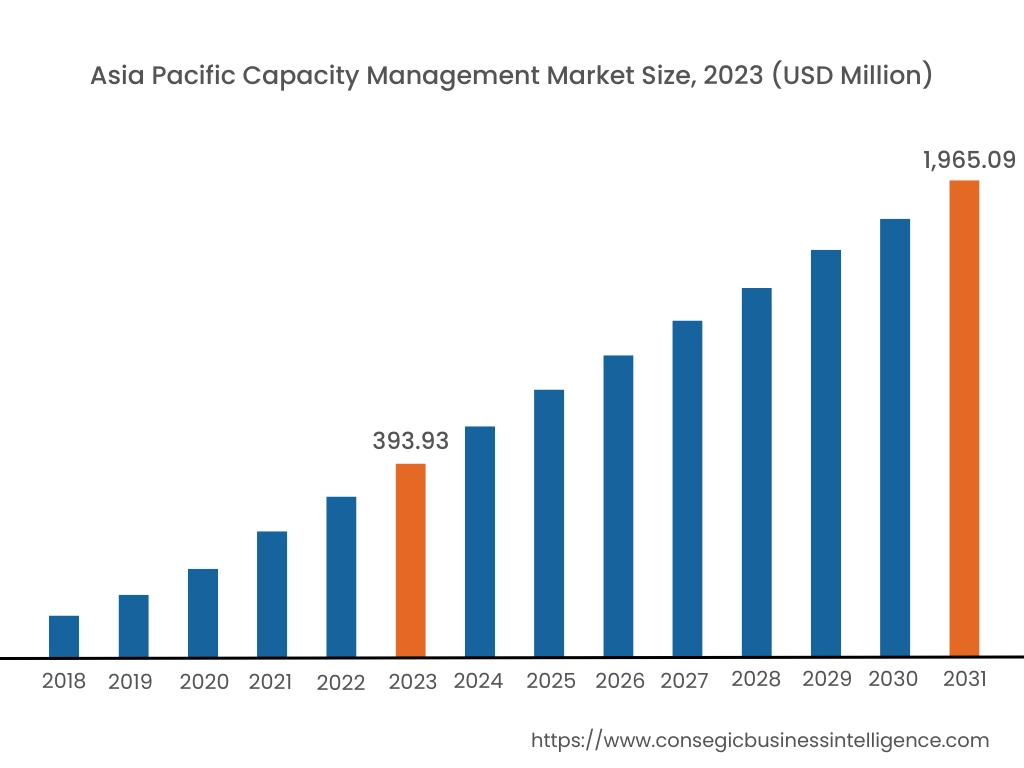
Asia Pacific region was valued at USD 393.93 million in 2023. Moreover, it is projected to grow by USD 473.87 Million in 2024 and reach over USD 1,965.09 Million by 2031. Out of these, China accounted for the largest share of 31.3% in 2023. Asia-Pacific is witnessing the fastest growth in the capacity management market, driven by increasing IT investments, rapid digitalization, and the development of cloud services in countries like China, Japan, and India. The region has become a global hub for IT services, with a strong emphasis on enhancing IT infrastructure and operational efficiency. The growing need for scalable and flexible IT solutions contributes to market expansion.
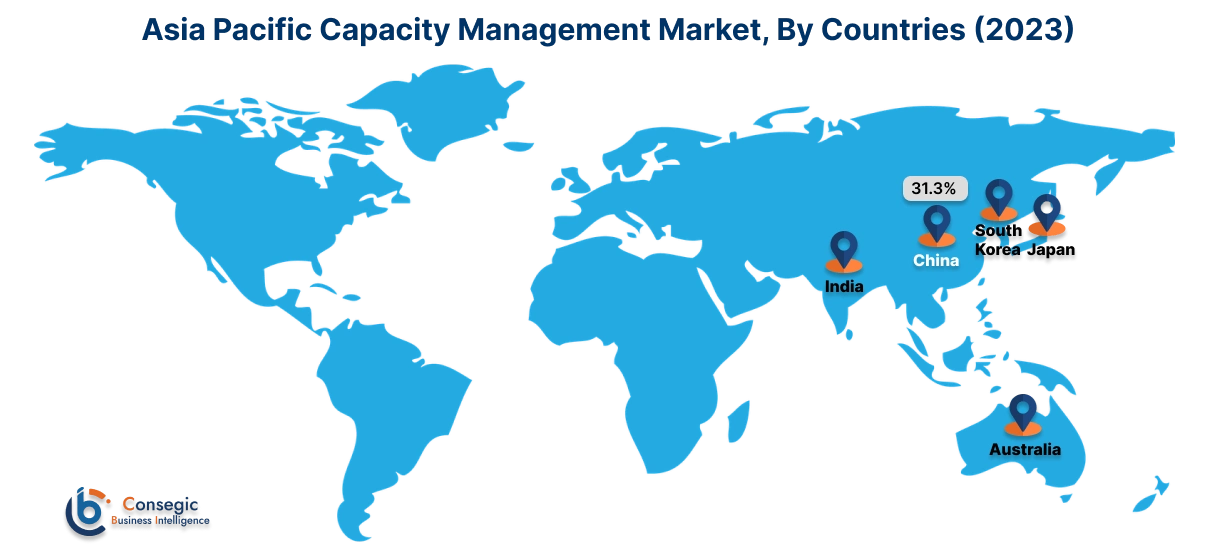
North America is estimated to reach over USD 2,807.61 Million by 2031 from a value of USD 579.38 Million in 2023 and is projected to grow by USD 695.24 Million in 2024. This region holds a substantial share of the capacity management market, primarily due to a well-established IT infrastructure and early adoption of advanced technologies. The United States, in particular, has a significant market presence, with major enterprises investing heavily in capacity management solutions to optimize their IT resources and enhance operational efficiency. The demand for these solutions is propelled by the need to manage complex IT environments and ensure seamless service delivery.
Europe represents a significant portion of the global capacity management market, with countries like Germany, the UK, and France leading in terms of adoption and innovation. The region benefits from strong government support for digital transformation initiatives and a robust industrial base. The focus on optimizing IT operations and reducing operational costs further accelerates the adoption of capacity management solutions.
The Middle East & Africa region shows promising potential in the capacity management market, particularly in countries like the UAE, Saudi Arabia, and South Africa. Increasing investments in IT infrastructure, a growing focus on digital transformation, and government initiatives to promote technological adoption drive the market pull for capacity management solutions. The expanding telecommunications sector and the adoption of cloud services further support market growth.
Latin America is an emerging market for capacity management solutions, with Brazil and Mexico being the primary growth drivers. The rising adoption of digital technologies, improving industrialization, and increasing focus on enhancing IT operations contribute to the market's expansion. Government initiatives aimed at modernizing IT infrastructure and promoting foreign investments support market growth.
Top Key Players & Market Share Insights:
The Capacity Management market is highly competitive with major players providing products and services to the national and international markets. Key players are adopting several strategies in research and development (R&D), product innovation, and end-user launches to hold a strong position in the global Capacity Management market. Key players in the Capacity Management industry include –
- BMC Software (USA)
- IBM Corporation (USA)
- Hewlett Packard Enterprise (HPE) (USA)
- Broadcom Inc. (USA)
- SolarWinds Corporation (USA)
- NetApp, Inc. (USA)
- ServiceNow, Inc. (USA)
- Splunk Inc. (USA)
- LogicMonitor, Inc. (USA)
- Apptio, Inc. (USA)
Recent Industry Developments :
Product Launches:
- In October 2024, TeleTracking launched Capacity IQ, a new capacity management solution Aimed at improving operational efficiency within and between healthcare facilities. The platform provides real-time insights and predictive analytics to optimize bed utilization and streamline patient flow. Additionally, Capacity IQ integrates with existing systems, allowing for seamless communication across facilities and enhancing resource allocation and management during peak times or emergencies.
- In April 2024, Hubstar launched an AI-powered space management technology designed to optimize workplace layouts. The solution uses artificial intelligence to analyze space utilization, improve office designs, reduce waste, and enhance overall productivity. It enables businesses to efficiently allocate space while meeting employee needs, ultimately driving cost savings and sustainability.
Partnerships and Collaborations:
- In April 2024, Transporeon and MODE Global announced a collaboration to enhance autonomous capacity management in logistics. The partnership integrates Transporeon's Autonomous Procurement technology into the MODE Global Marketplace, enabling more dynamic freight procurement and streamlined tendering. This collaboration aims to optimize supply chain operations with AI-driven insights, offering better pricing, increased efficiency, and a more flexible, data-powered approach to logistics.
Capacity Management Market Report Insights :
| Report Attributes | Report Details |
| Study Timeline | 2018-2031 |
| Market Size in 2031 | USD 7,910.98 Million |
| CAGR (2024-2031) | 21.7% |
| By Component |
|
| By Organization Size |
|
| By Deployment Mode |
|
| By Industry Vertical |
|
| By Region |
|
| Key Players |
|
| North America | U.S. Canada Mexico |
| Europe | U.K. Germany France Spain Italy Russia Benelux Rest of Europe |
| APAC | China South Korea Japan India Australia ASEAN Rest of Asia-Pacific |
| Middle East and Africa | GCC Turkey South Africa Rest of MEA |
| LATAM | Brazil Argentina Chile Rest of LATAM |
| Report Coverage |
|
Key Questions Answered in the Report
How big is the Capacity Management market? +
Capacity Management Market size is estimated to reach over USD 7,910.98 Million by 2031 from a value of USD 1,640.98 Million in 2023 and is projected to grow by USD 1,968.30 Million in 2024, growing at a CAGR of 21.7% from 2024 to 2031.
What specific segmentation details are covered in the Capacity Management Market report? +
The Capacity Management market report includes segmentation details for component, organization size, deployment mode, industry vertical, and region.
Which region holds the largest share in the Capacity Management Market? +
North America holds the largest share in the Capacity Management market, attributed to high demand for advanced IT infrastructure management solutions and the presence of major technology providers.
Who are the major players in the Capacity Management Market? +
The key players in the Capacity Management market include BMC Software (USA), IBM Corporation (USA), Hewlett Packard Enterprise (HPE) (USA), Broadcom Inc. (USA), SolarWinds Corporation (USA), NetApp, Inc. (USA), ServiceNow, Inc. (USA), Splunk Inc. (USA), LogicMonitor, Inc. (USA), and Apptio, Inc. (USA).
